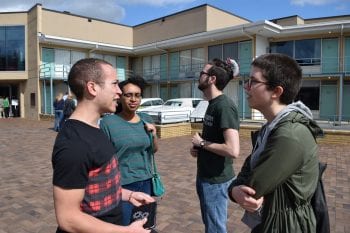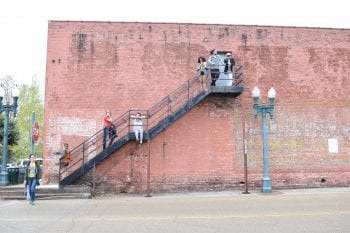Immersion experiences are one way the Gephardt Institute encourages students to go beyond hands-on work, challenging them to think critically and compassionately about social issues. During spring break, the Gephardt Institute coordinated a student-led immersion trip to Memphis, Tennessee to peel back layers of community to understand social issues surrounding civil rights, diversity, and inclusion. Two students reflect on their week together in Memphis.
Emma Riley, a communications design student in the Sam Fox School of Design and Visual Arts, and a trip co-leader
I am white. My co-leader, Julia, is also white. As we prepared for Memphis Immersion, we recognized that this set-up was problematic, but we were not sure to what degree. I believed that calling attention to my whiteness was enough to create an atmosphere of honesty and trust. I believed that Julia and I, as experienced student leaders, could divorce our skills from our biases as white people.
I have since come to the understanding that I should not have led Memphis Immersion. My whiteness was an ever-present condition, which I could not erase if I wanted to. My position as a white leader posed a problem with no solution. As a leader, it was my responsibility to be present. But as a white person, it was my responsibility to fade into the background.
Shortly after the trip ended, I read an article from Everyday Feminism called “5 Ways to Avoid Common Ally Pitfalls.” In the article, Jamie Utt explains that if one is in a position of power (say because she is straight, or white, or cisgender) the simple act of speaking can drown out marginalized voices and thus reinforce existing power structures. Reading that article, I felt my numerous mistakes. I thought of all of the times I spoke when I should have listened.
But—honestly—I feel conflicted. Because I am glad the trip happened. I am grateful for my new friends, who are trusting, patient, and comfortable with discomfort. I am grateful that these friends called me out on my mistakes and biases. I am grateful that I got to know Memphis, because it allowed me to see my hometown of St. Louis in a different way. And I am grateful for our new relationships with the passionate people of Memphis.
Is that terrible to say…that I am grateful? I am not sure yet. I know the trip has impacted me greatly. I feel confused and conflicted and angry and inspired. And it is okay that I feel that way. I think it means the trip did something right.
Jarian Cottingham, a computer science major in the School of Engineering, and a trip participant
Most trips have a beginning, middle and an end, but I can’t say that I’ve quite reached the end of my travels in Memphis this past spring break. Before leaving on Memphis Immersion, we discussed carrying thoughts and reflections from Memphis throughout our lives. But thoughts are almost weightless, able to float away with the gusts of excitements and disappointments that make up the daily climate of our days. I needed something physical, something permanent that would never let me forget my mission, to advance humans, more specifically balancing the scales among all of the races, starting with expanding opportunities for one of the most persecuted groups of people in human history.
Some organizations that stood out to me:
- MIFA (Metropolitan Inter-Faith Association): Delivering food to grandmas and grandpas that remind you of yours back home in Mississippi, you realize that these people have children, but why aren’t the children able to support their parents?
- Bridges: We discussed complex issue of race with high schoolers, some about to explore the new world of college in less than a year. I realized that they, at such a young age, already had flawed understandings of race that they must work hard at ridding themselves of through a short afterschool program.
- Memphis City Beautiful: Discussing with Wayne how the lack of volunteers to help clean up the park by cutting trees and clearing weeds will make the prep work for construction spread out over three years, but then you ask yourself a question: Who will maintain the park after its completion?
Thinking back to before the trip, I left thinking that I wouldn’t get much from it, but I could correct the group’s misperceptions of an experience because they can’t view it through the “black” lens. But, then I realized just how curved the black lens is among the entire race. I realized how I held only the lenses of my own and those of my black friends. I started to get a clear view of my own privilege. Though I’m followed through Radio Shack, waited on last in restaurants (or never at all), verbally told to never be in interracial relationships with white women and told that my race is intellectually genetically handicapped – I still did/do not have to experience a disjointed family, poverty, low-funded public schools and police discrimination.
I never want to forget this insight. In Computer Science, we have structures called hash tables, which are used to instantly store and retrieve information. For a human, this is like looking at a picture from graduation and flashing back to the ceremony. It’s instant and powerful. So I got a tattoo. And it says “black”! There’s so much in its meaning, but to me, it flashes me back to the trip and my insights. For non-blacks, it’s a call to question the validity of stereotypes. For blacks, it’s a proclamation of my stance in support of my brothers and sisters.

